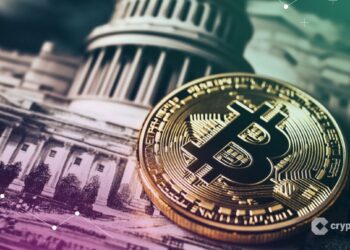Solana’s August was a rollercoaster – price drops and rebounds, surging user activity, and a setback for potential Solana ETFs in the U.S. Dive into the report to understand Solana’s current state and future prospects.
Key takeaways:
- Solana’s native token, SOL, experienced significant price volatility in August, with a 32% drop at one point followed by a 42% rally. The month ended with SOL trading at $135.
- Despite price fluctuations, the Solana network saw a 62% increase in weekly active addresses and a new yearly high of 3.5 million daily active users.
- TVL in Solana dApps reached its highest level since October 2022, but some leading protocols like Marinade Finance saw significant declines.
- Solana DEX volume reached $42 billion in August, down 27% from July.
- Regulatory hurdles in the United States put the approval of Solana ETFs on hold, while Brazil moves forward with the world’s first spot Solana ETF.
- While Solana-based meme coin activity spiked in August with tools like Pump.fun, most projects (98,59%) failed, raising concerns about long-term sustainability.
- Solana NFT sales volume decreased by 18% in August, reaching $78.7 million. Despite this decline, Magic Eden, a leading marketplace, captured the largest market share of 36.7% with a trading volume of $122.47 million.
What You’ll Find in This August Solana Ecosystem Analysis:
- What is Solana?
- Solana’s User Base Thrives Despite SOL Price Stagnation
- Solana Funds See Outflows, ETF Hopes Put on Hold
- Solana Ecosystem Thrives Amidst Market Turbulence
- Solana’s Meme Coin Frenzy
- Solana DEXs: A Slight Dip in Trading Volume
- Solana NFTs: Declines, Standouts, and Magic Eden’s Rise
- Solana’s Future Hinges on Balancing Growth and Challenges
What is Solana?
Solana is an open-source blockchain platform founded in 2017, emphasizing scalability and speed. With its unique Layer 1 network architecture, it processes over 710,000 transactions per second, enabling the creation of smart contracts and decentralized applications (dApps) for various use cases, such as decentralized finance (DeFi) and nonfungible tokens (NFTs) marketplaces. Unlike Ethereum, Solana does not require additional scaling solutions, relying on powerful computers for network maintenance and data storage. Its native cryptocurrency, SOL, is essential for transactions and network security through staking.
Solana’s User Base Thrives Despite SOL Price Stagnation
Solana’s native token, SOL, entered August close to $170, but faced headwinds throughout the month and fell to $115 by Aug. 5, a 32% decline. The downtrend was short-lived, however, as the coin staged a remarkable comeback, jumping to $163 on Aug. 8 (+42%).
But the rollercoaster wasn’t over yet. SOL took another hit, dropping to $138 by Aug. 16, then the token managed to bounce back (again) to $161 on Aug. 25. However, the month ended on a sour note, with SOL dropping back to $135.
SOL has been stuck in a holding pattern since early April 2024, unable to break free from a prolonged period of sideways consolidation. Despite the recent milestone of the Solana-based PayPal stablecoin (PYUSD) surpassing a market capitalization of $1 billion, on-chain activity and overall demand for Solana investments products have been steadily declining in recent weeks.
This lackluster performance stands in stark contrast to the bullish sentiment that once surrounded Solana, often touted as a potential “Ethereum killer.” However, the network has faced challenges in maintaining its momentum, and the recent price stagnation has raised concerns about its long-term prospects.
On-chain data from the Solana network shows a decrease in transaction volume in August. The network processed 1.03 billion transactions in August, a decrease of 21% compared to July (1.31 billion transactions).
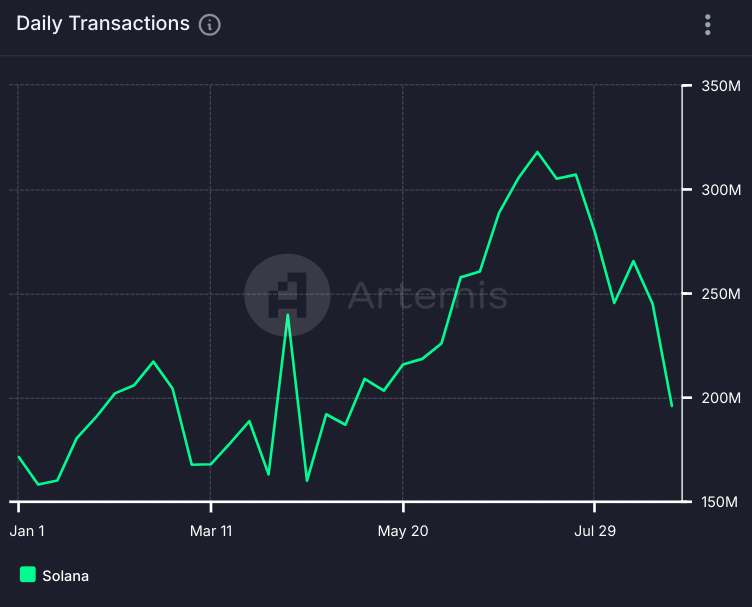
Solana experienced a decline in its derivatives market, as evidenced by a 33% drop in open interest (OI) in August. The OI for SOL derivatives plummeted from a high of $3.09 billion on July 31 to $2.07 billion on Aug. 31, indicating a significant loss of interest in leveraged trading and other derivative products tied to the Solana token. This decline suggests that traders are becoming more cautious or less confident in the short-term prospects of SOL.

However, while the overall sentiment surrounding Solana has been subdued, there are some encouraging signs. For instance, total deposits in Solana-based decentralized applications (dApps) have recently reached their highest levels since Oct. 16, 2022, indicating a growing interest in the network’s ecosystem.
In August, Solana network dApps collectively held $5.2 billion, representing a 13.4% increase from July (4.5 billion).
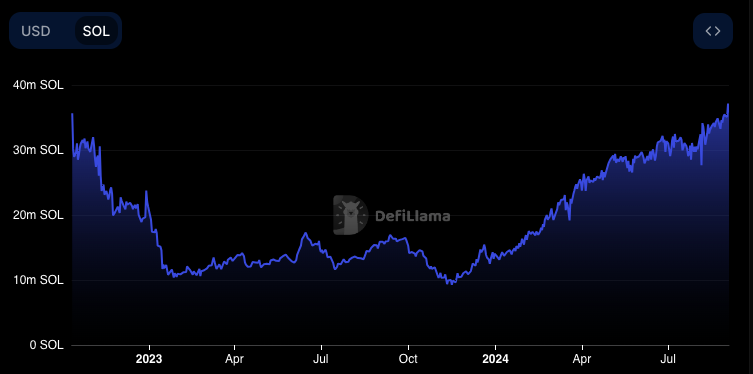
Despite Solana’s recent price struggles, the network saw a surge in user activity in August. On August 6, the weekly average of active addresses reached 1.6 million, and since then this number has steadily increased, reaching 2.6 million in the week between Aug. 19 and 25, and 3.3 million in the week between Aug. 26 and Sep. 2, an increase of 62% and 27% respectively.
On Aug. 30, Solana recorded a new yearly high of 3.5 million active daily users, according to Artemis data. This indicates that despite the challenges facing the network, its ecosystem continues to attract and retain users.
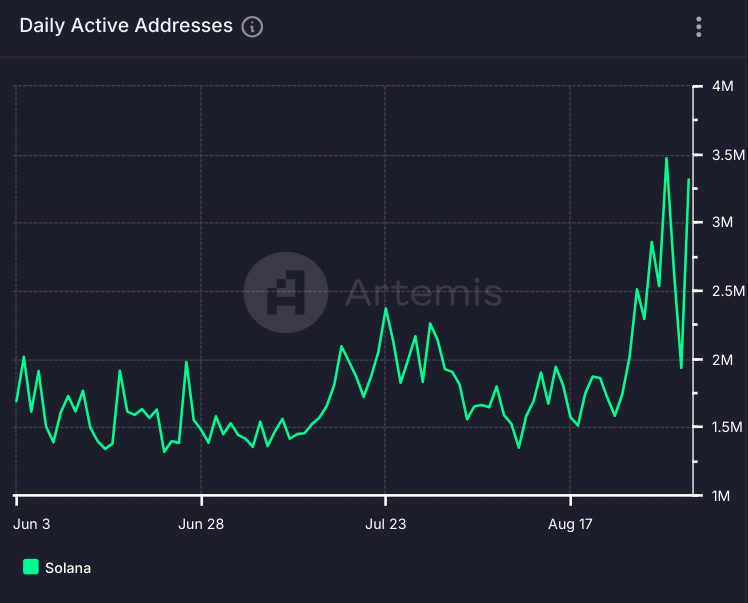
The total daily transaction fees generated by the Solana blockchain experienced a sharp decline in August, reaching their lowest level since early May 2024. On Aug. 31, these fees dropped to just $522k, representing a significant 77% decrease from 2.31 million on July 31 and an astonishing 89% decline from the all-time high of $5.08 million recorded on March 18.
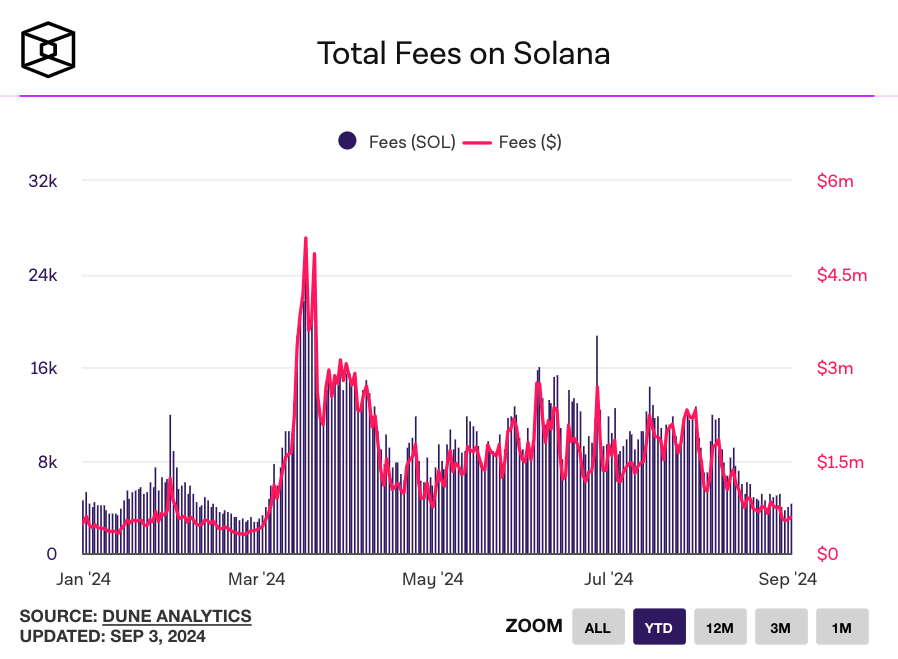
This decrease in daily transaction fees could be interpreted as a sign of decreased overall network activity, or potentially a cooldown in the meme coin frenzy that drove fees up earlier in the year.
Solana Funds See Outflows, ETF Hopes Put on Hold
Solana-based financial products experienced a controversial bag of news and decisions in August 2024. While record outflows in August were reported, news from Brazil of the world’s first spot Solana ETF launch rekindled hopes for exchange-traded funds (ETFs) also beyond Bitcoin (BTC) and Ether (ETH).
August Sees Record Outflows from Solana
CoinShares, a digital asset investment firm, documented an outflow of $39 million from Solana investment products in the week of 9-17 August. This stands as the highest outflow recorded for Solana so far. CoinShares blamed the surge in outflows on a sharp decline in meme coin trading, which it said Solana relies on “heavily”.
Solana investments’ products also struggled to attract capital during the week of August 18-24, with inflows of only $0.1 million. However, in the last week of the month (August 24-31) they saw an increase in capital with inflows of $7.6 million.
Solana ETF Approval in the U.S. – Legal Hurdles
The U.S. Securities and Exchange Commission (SEC) held discussions with potential Solana ETF issuers about concerns regarding Solana’s potential classification as a security. Following these talks, the SEC rejected the 19b-4 forms submitted by Cboe BZX, leading to their removal from the exchange’s website.
Forms 19b-4 for VanEck and 21Shares Solana ETFs appear to have been removed from the CBOE website.
Documents SR-CboeBZX-2024-066 & SR-CboeBZX-2024-067 aren’t accessible anymore via direct link, and are no longer visible in BZX Pending Rule Changes.
Another interesting thing is… pic.twitter.com/t81kVGJ3uH
— Summers (@SummersThings) August 16, 2024
For an ETF to be approved, both the 19b-4 forms and S-1 registration statements must be approved. The S-1 forms do not have specific deadlines.
Currently, 21Shares and VanEck are competing to launch a Solana ETF.
VanEck’s Head of Digital Assets Research, Matthew Sigel, confirmed in an X post from Aug. 19 that their application is still under consideration by the SEC. According to Sigel, VanEck classifies Solana as a commodity, similar to Bitcoin and Ether. This classification is crucial for Solana to obtain its own spot ETF in the USA.
This belief is based on evolving legal interpretations, where courts and regulators are increasingly recognizing that certain crypto assets may function as securities in primary markets but exhibit commodity-like characteristics in secondary markets.
Digging deeper into commodity classification:
Courts have drawn parallels between natural gas and digital tokens. For natural gas, it doesn’t matter if the gas is delivered to different hubs like Henry Hub in Louisiana or elsewhere: if futures contracts exist for one, all types… https://t.co/DKV8I0hcU9— matthew sigel, recovering CFA (@matthew_sigel) August 20, 2024
For example, in 2018, the Commodities Futures Trading Commission (CFTC) accused the founders of a firm of fraudulently selling a “My Big Coin” token to customers and making false claims about its use and value. The defendants argued that the token was not a commodity because there were no futures contracts referencing it. However, the judge ruled that it was a “virtual currency” similar to Bitcoin and, therefore, a commodity. The founder was later convicted and sentenced to prison.
Sigel believes that the same logic could apply to digital assets like Solana. “We remain committed to advocating this position alongside our exchange partners to the appropriate regulators,” he said.
However, other ETF analysts are less optimistic. Bloomberg’s Eric Balchunas noted that after Cboe removed its filings for Solana ETFs from its website, their chances of approval are slim.
Nice flow chart showing how the Solana ETF filings never made it past Step 2 (the SEC failed to ack them) = DOA. So the exchanges withdrew 19b-4s altho the issuers' S-1s are still active. A snowball's chance in hell of approval unless there's change in leadership via @JSeyff pic.twitter.com/e8BNKT33KH
— Eric Balchunas (@EricBalchunas) August 20, 2024
Brazil Frontrunners in the ETF Race
While the U.S. grapples with regulatory issues, Brazil appears to be stealing the show and plans to launch the world’s first spot Solana ETF in Brazil.
The first spot Solana ETF is currently pending approval from the Brazilian stock exchange, B3, after it was approved by Brazil’s Securities and Exchange Commission (CVM) on Aug. 7.
Solana Ecosystem Thrives Amidst Market Turbulence
August saw the Solana ecosystem buzzing with activity, showcasing both innovative developments and continued investor confidence. Here’s a closer look at some of the key events:
Bridging the Chains
On Aug. 15, centralized crypto exchange OKX expanded its OKX Wallet to include Solana’s blockchain links, or Blinks, making it accessible across all Ethereum Virtual Machine (EVM)-compatible chains.
This allows users to seamlessly transfer assets between Solana and other popular blockchains, potentially boosting interoperability and user experience.
USDe Expands to Solana
On Aug. 7, Ethena Labs, the developer behind the USDe stablecoin, launched USDe on the Solana network. Solana can now be used as collateral for USDe loans, pending approval from Ethena (ENA) token holders. USDe has also been integrated with several Solana dApps, including KaminoFinance, Orca, Drift, and Jito.
Prior to the Solana launch, USDe was exclusively available on Ethereum, and loans could be secured using Ether or Bitcoin as collateral.
USDe is live on Solana as of today, August 7th
Read below for a list of our app integrations with USDe and sUSDe
pic.twitter.com/vik1qESbN5
— Ethena Labs (@ethena_labs) August 7, 2024
Solana Projects Attract Significant Funding
Despite broader market turbulence, Solana-based projects continued to attract investment.
Andrena, a developer of a decentralized physical infrastructure network (DePIN) protocol, raised $18 million in a funding round, bringing its total funding to $38 million. The round was led by Dragonfly, with participation from CMT Digital, Castle Island Ventures, Wintermute Ventures, and others. The funding will support Andrena’s efforts to provide decentralized internet services on the Solana blockchain.
Solayer Labs, developer of a Solana restaking protocol, secured $12 million in seed funding, reaching an $80 million valuation. The round was led by Polychain Capital, with participation from Big Brain Holdings, Hack VC, Nomad Capital, and others. This fresh injection of capital will fuel Solayer’s mission to supercharge Solana’s network infrastructure and transaction speeds.
1/ hi again! excited to announce our $12M round led by @polychain
to build the restaking network on Solana pic.twitter.com/yksgvqlHjo
— Solayer (@solayer_labs) August 27, 2024
Solana’s Meme Coin Frenzy
Solana’s summer saw a surge in meme coin activity, with creation tools like Pump.fun attracting a wave of new projects. However, a closer look reveals a sobering reality: the vast majority of these meme coins never make it past the launchpad.
Data from Dune Analytics paints a stark picture. Only 1.41% of tokens created on Pump.fun manage to graduate to Raydium, a decentralized finance protocol on Solana. Even at its peak in February, the graduation rate reached a meager 2.56%.
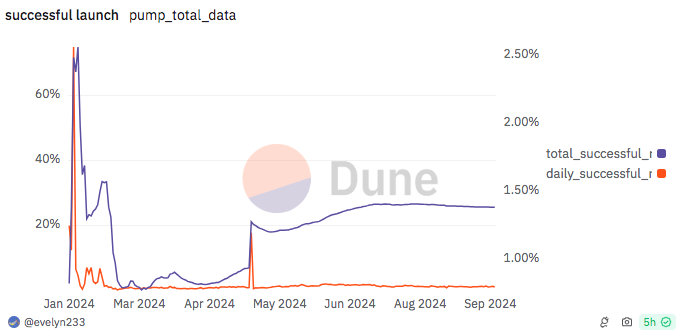
This low success rate raises concerns about the sustainability of the Solana meme coin activity. While the initial hype may attract new users and generate buzz, the vast majority of projects fail to gain traction, leading to a landscape dominated by short-lived speculation.
However, there’s another side to the story – revenue. Pump.fun charges a 1% transaction fee for launched tokens until they reach a specific market cap threshold. This fee structure has proven to be lucrative, with Pump.fun reaching a record-breaking monthly revenue of $28.73 million in July.
On Aug. 12, this revenue reached 35,076 SOL (more than $5.3 million), surpassing Ethereum, Solana, Tron (TRX) and everyone else on that day.
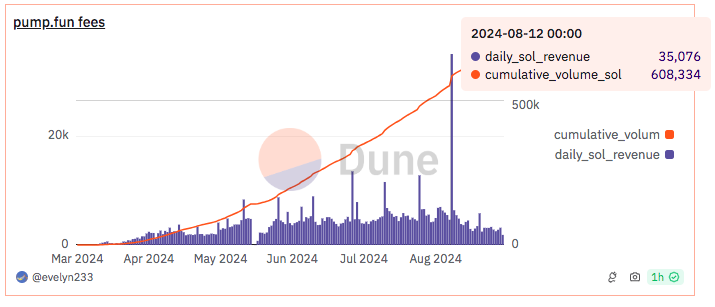
In August, Solana-based meme coins experienced mixed fortunes. While some surged, others retreated. Dogwifhat (WIF) saw a modest 4.3% gain, while Bonk (BONK) and Book of Meme (BOME) struggled, losing 12.2% and 13.9%, respectively. In contrast, PopCap (POPCAT) and Gigachad (GIGA) rallied, with gains of 31% and 67.6%, respectively. Fwog (FWOG) stole the show with an impressive 375.5% surge.
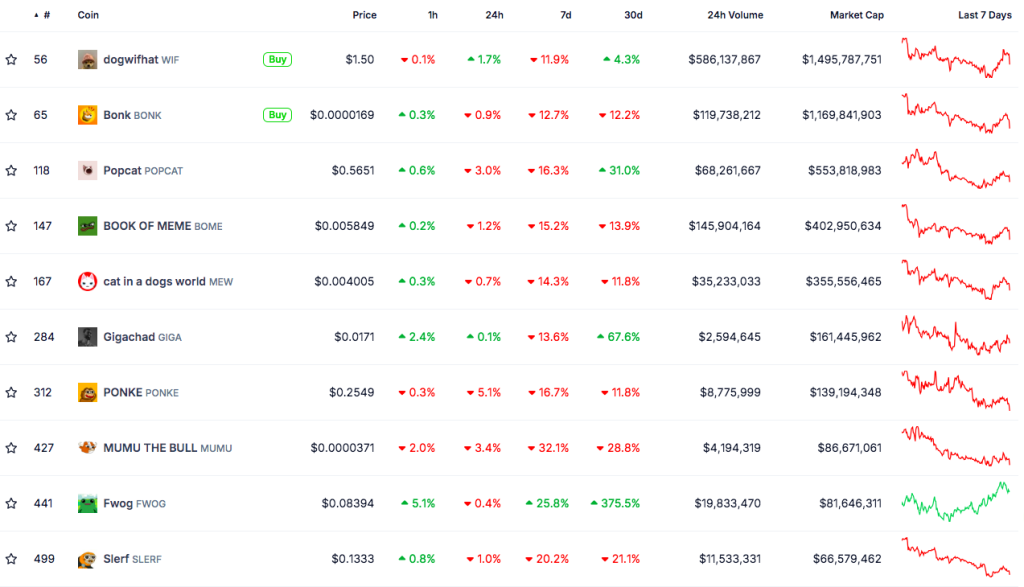
Solana’s Dumpy.fun Flips the Script: From Shorting to Squeezing
Dumpy.fun, another Solana protocol originally designed to facilitate the shorting of meme coins, launched a new application called “squeezy.lol” that goes against their original concept. Instead of allowing users to short memecoins, squeezy.lol allows them to go long on heavily shorted tokens, potentially triggering a “short squeeze”.
Get ready for a new era of PvP.
We've been working on @squeezydotlol, which allows users to take the other side of dumpy. It features the squeeze explorer, which shows onchain short positions.
Launching 8/27. pic.twitter.com/WhwoyxJZ3q
— dumpy.fun (@dumpydotfun) August 20, 2024
“Shorting”, in essence, is a bet that an asset’s price will fall. With the recent drop in several Solana meme coins, many traders on Dumpy.fun might have found success betting against them.
Dumpy.fun’s current support extends to 11 meme coins, including popular ones like Dogwifhat, Bonk and Wen (WEN).
Pacmoon Migrates from Ethereum to Solana
Pacmoon, the dominant meme coin on the Blast network, announced on Aug. 7 that it will be leaving the Ethereum Layer 2 blockchain and migrating to Solana. As part of this migration, Pacmoon will be rebranded, with the new token symbol being ARMY.
The decision to leave Blast was driven by the team’s dissatisfaction with the network’s focus. According to Lamboland, a member of the Pacmoon team, Blast prioritized technology over community and culture. “We think that tokens, community, and culture are what make a blockchain successful. However, Blast never focused on that.”
We are leaving Blast.
The last 6 months have been some of the best moments of my life and also the worst.
I'll never forget when we pulled an all nighter for our launch or when Beeple made his first Pacmoon everyday.
But building on Blast has always been an uphill battle for…
— Lamboland (@Lamboland_) August 7, 2024
Solana DEXs: A Slight Dip in Trading Volume
The overall trading volume on decentralized exchanges (DEXs) experienced a slight decline in August. DeFiLlama data revealed that DEX platforms handled just over $181 billion in crypto assets during the month, down from $198 billion in July.
Ethereum remained the dominant chain for DEX activity, accounting for over $52.6 billion in volume. Solana and Arbitrum followed with $42 billion and $22.3 billion, respectively. Tron saw significant growth, largely driven by the recent launch of the SunPump meme coin generator. Its largest DEX, SUN, recorded $3.2 billion in volume.
Solana’s DEX volume was impacted by the slump in meme coin prices, with Bonk, Book of Meme, and Dogwifhat losing over 60% of their year-to-date highs.

Marinade Finance, the leading DeFi protocol on Solana, experienced a significant decline in August, with its TVL dropping by 26%. This downturn reduced its TVL to approximately $640 million.
Other Solana-based DeFi protocols and DEXs also faced challenges. Orca saw a modest gain of 6.75%, while Solend, Tulip Protocol, and Parrot experienced declines of 21%, 22%, and 16% in TVL, respectively.
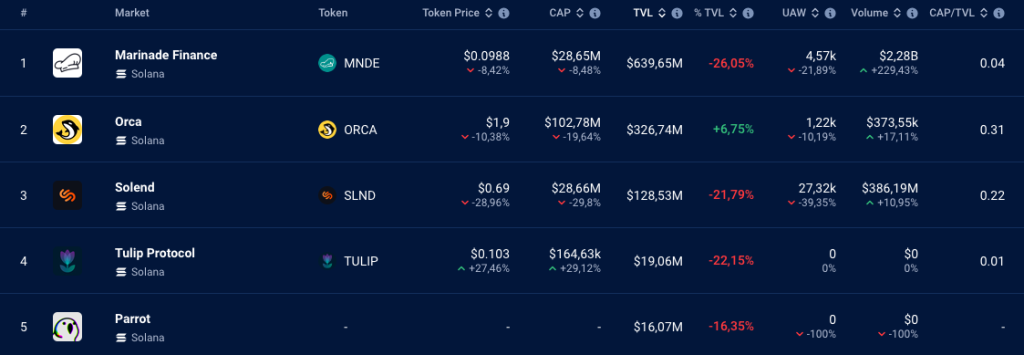
Other updates around Solana DeFi:
Drift Protocol, a Solana-based derivatives platform, launched a prediction market called BET, short for “Bullish on Everything”. According to an X post from Aug. 19, the new platform will allow users to speculate on the future prices of assets or the outcome of events.
Today, we're launching BET on Drift — the first capital efficient prediction markets on @Solana @DriftProtocol
Here's why, and why now:
A prediction market is not only a natural extension of trading — it’s the future of trading. Prediction markets are the natural evolution of… pic.twitter.com/az3zdLZxy0
— cindy (@cindyleowtt) August 19, 2024
Solana Optimistic Network (SOON), a Solana-based Layer 2 scaling solution, closed a funding round. Unlike traditional venture capital-backed rounds, SOON’s “co-builder” round exclusively sought funds from individual participants, including executives from prominent Web3 entities like Solana Foundation, Solana Labs, Coinbase Ventures, Celestia, and Avail.
SOON is designed to be an efficient and performant rollup capable of settling transactions on any Layer 1 blockchain. By leveraging the Solana Virtual Machine (SVM) as its execution layer, SOON aims to provide a scalable and cost-effective solution for developers and users building on the Solana network.
Renzo, a liquid restaking protocol on Ethereum, announced its entry into the Solana ecosystem. Through a partnership with the Jito Foundation, Renzo will launch ezSOL, a liquid restaking token for Solana. This will allow users to earn staking rewards while maintaining liquidity for their SOL holdings, potentially increasing the attractiveness of staking within the Solana ecosystem.
Binance Labs, the venture capital arm of the cryptocurrency exchange Binance, invested an undisclosed sum in Solayer, a Solana-based restaking protocol. This recent investment will provide Solayer with the necessary resources to expand its team and attract additional protocols to its ecosystem.
Solana NFTs: Declines, Standouts, and Magic Eden’s Rise
Although the overall NFT market is experiencing a decline, Solana-based NFTs have also seen a significant decline, with sales dropping by over 36% between Aug. 2 and Sep. 1. Despite this decline, Solana has managed to maintain its position as the second-largest blockchain, surpassing Bitcoin and Polygon.
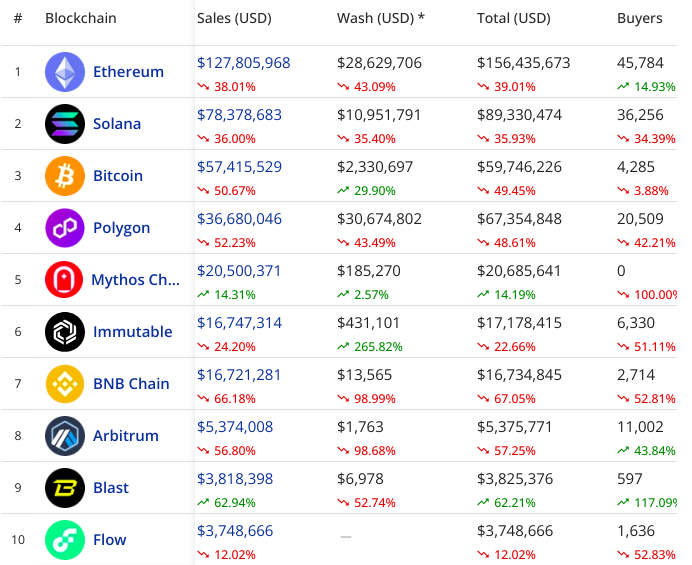
In August, Solana’s NFT sales decreased 18% month over month to $78.7 million. The number of buyers also declined by 12% to 398k, while the number of sellers remained relatively stable at 102k. Overall, NFT transactions on Solana decreased by 28% to just over 1,1k.

While DogeZuki, a Solana-based NFT collection, maintained its top position, it experienced a notable decline of over 22% in August. Solana Money Business also saw a significant drop of nearly 30%. Mad Labs and Froganas experienced decreases as well, with sales volumes falling by 28% and 62%, respectively. However, there were some bright spots in the market: DeGods and y00ts saw impressive gains, with sales volumes increasing by 320% and 269%, respectively.
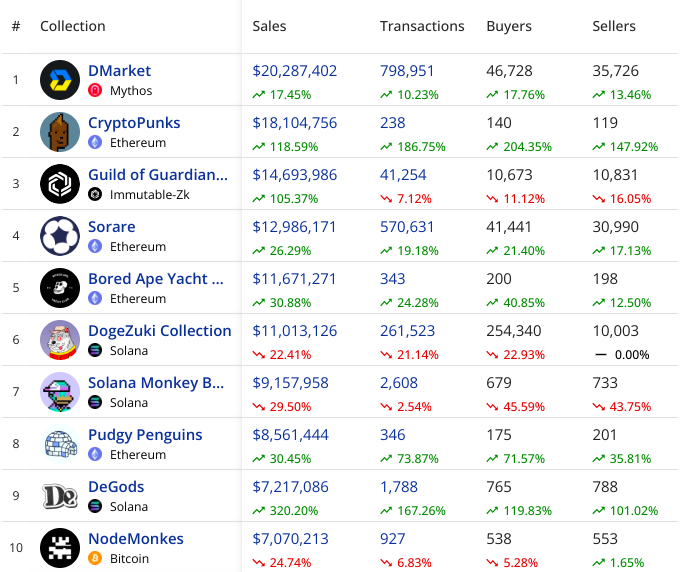
In August, Magic Eden, a leading Solana NFT marketplace, captured the largest market share of 36.7% with a trading volume of $122.47 million, surpassing competitors like OpenSea and Blur. This surge in trading volume can be attributed, in part, to Magic Eden’s integration of the popular Bitcoin Ordinals protocol.
What are the top NFT marketplaces in 2024?
Our latest study reveals that @MagicEden is the top NFT Marketplace in 2024, with a 36.7% share and $122.47M in August trading volume, marking its sixth consecutive month at the top.
Read the full study: https://t.co/ib2r2f3e1T pic.twitter.com/3Gj17T0tU2
— CoinGecko (@coingecko) September 4, 2024
In addition, the Magic Eden Foundation announced plans to launch the ME token, a new cryptocurrency designed to fuel the growth of Web3 consumer dApps through cross-chain digital asset trading.
The ME token will play a central role in the Magic Eden platform. Magic Eden will be the first company to officially adopt ME as its ecosystem token.
Notable NFT launches in August:
- Goodies (August 1 – August 8): As a follow-up to the successful Goofies launch, the Goodies NFT collection aims to expand the community surrounding the upcoming Goofies Village game. By offering a free mint, the project seeks to attract a wider audience and foster a strong community base, contributing to the game’s success.
- Beist Golden Ticket (August 5 – August 12): This limited-edition NFT collection consists of 500 items. By holding and staking these NFTs, holders can earn BEIST airdrop tokens. Additionally, airdrop points can be increased by participating in the project’s engaging tap-to-earn game.
- Radicals (August 31 – September 7): Radicals is an NFT collection featuring 5,140 unique 3D animated characters. Specializing in hyper-realistic digital apparel and accessories, Radicals pushes the boundaries of digital fashion. Launched on the Solana blockchain, this collection offers one-of-a-kind NFTs with an extensive array of traits, including exclusive items, customized sneakers, garments, and accessories.
Solana’s Future Hinges on Balancing Growth and Challenges
Solana’s August was a rollercoaster of price fluctuations, but beneath the surface, the network demonstrated resilience and growth. The surge in user activity, despite price volatility, highlights the network’s potential to attract and retain users.
However, challenges remain. The meme coin frenzy, while attracting new users, raises concerns about long-term sustainability. The SEC’s stance on Solana ETFs and the broader regulatory landscape also pose uncertainties.
Solana’s future hinges on its ability to attract top-notch DeFi projects and developers, creating a thriving ecosystem. Additionally, capitalizing on its growing user base is key to driving adoption and potentially boosting the price of SOL.
Another crucial factor in Solana’s future may be the upcoming Firedancer upgrade, developed by Jump Crypto. This alternative client implementation aims to significantly boost Solana’s transaction processing capabilities and overall network resilience. If successful, Firedancer could allow Solana to handle millions of transactions per second, setting a new standard for blockchain scalability.
The post From Price Swings to ETF Battles: What’s Really Happening with Solana? appeared first on Cryptonews.


